DAIRY TECHNOLOGY
Introduction to the Career
India has the largest number of cattle in the world. This makes India a global leader in milk production and other milk products. With the advent of technology and need of the time, the dairy sector has been upgraded to the status of an industry. Dairy technology is the vital link between the dairy sector and dairy industry. Dairy industry, now a highly specialized field today involves production, procurement, storage, processing and distribution of dairy products. Every morning in India starts with our 'doodhwala'. Dairy industry is one of the industries which plays a dynamic role in India's agro-based economy.
It includes breeding and care of milk yielding cattle, procuring milk and processing of milk into a variety of dairy products. Dairy products are a major exporting industry and earns considerable foreign exchange for the country. In 1946, the foundation of Anand Milk Union Ltd (AMUL), led to the development of a better organized dairy industry and gave momentum to education in dairying in India. Some cooperatives and companies set up their own dairy farms. These dairy farms engage services of dairy engineers who are responsible for the setting up and maintenance of dairy plants and related activities and marketing personnel who handle the marketing and sales of milk and milk products.
Eligibility and Course Areas
Qualifications Traditionally dairy technology was a part of veterinary and animal husbandry courses. These courses were and still is offered by Agricultural Universities as a part of the B.VSc, (Bachelor of Veterinary Science and Animal Husbandry). Now there are several institutes offering exclusive diploma, undergraduate and postgraduate courses in Dairy technology. Many general universities also offer dairy science as vocational subject at the BSc level. Dairying is also available as a vocational subject for the 10+2 level education in India. A dairy technology course comprises of three basic areas like:
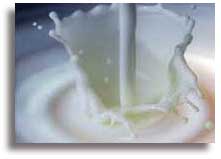
Course Areas:
Courses in dairy technology are available at the diploma, graduation, postgraduate and doctoral levels. The diploma and degree courses in dairy technology require candidates who have passed the 10 + 2 examination, with Chemistry, Physics, Mathematics and English or Physics, Chemistry, Biology or Agriculture with a minimum aggregate of 50 % marks. The diploma courses of two years duration include Indian Dairy Diploma (IDD) and National Dairy Diploma (NDD). This is a base course for BSc / B.Tech dairy degree and gives basic knowledge on breeding, feeding of animals, their health care, farm management, planning a farm, milk products, dairy chemistry, bacteriology, book keeping, etc. At the graduation level, the course is usually called B.Tech./B.Sc. in Dairy technology or Dairy Science.
Selection:
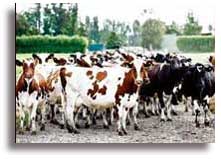
About 36 colleges where Indian Veterinary council Act, 1984 extends take in 15% of candidates from around the country based on a common entrance test for the Degree course.This Entrance exam is usually held in the month of May each year. For admission to masters degree programme, an All India Entrance Examination is conducted by the Indian Council for Agricultural Research (ICAR).
Desired and Essential Skills
Persons aspiring to make a career in dairy technology should have scientific temper, willingness to work hard, commitment, an enquiring mind and cleanliness. They must be prepared to live in remote areas, or far away from the comforts and conveniences of the city.
Nature of Work and Job Description
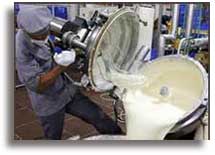
After the milk has reached the plant, processing work begins and it is converted into a variety of dairy products. Dairy Technologists mainly deal with the technical and quality control aspect of the processing industry and also work to develop improved methods in processing, production preservation and utilization of milk and milk products. Other professionals required in this area include Dairy engineers, who are responsible for dairy maintenance and related activities and Marketing personnel who handle the marketing and sales of milk and milk products. Dairy technology needs professionals like procurement officers, who can collect milk from farmers, cattle-rearers, milk-booths, dairy owners and other individuals or groups. The procurement officer should be abreast with the technology to check the quality and quantity of the milk from such different locations to the destined common location or factory.
Job Prospects and Career Options
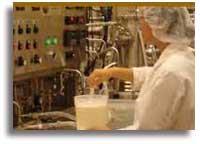
Top Recruiters and Companies
- MUL- Amul is the acronym for Anand Milk Union Limited, a dairy cooperative
company in Gujarat , India that markets a wide range of dairy products. - Heritage Foods is one of the largest private sector company.
- Infra Developers Limited and other associated Companies.
- Mother Dairy set up in 1974, is a wholly owned subsidiary of Dairy Development Board (NDDB) of India . The company derives significant competitive advantage.
- Britannia Industries- Britannia Industries Limited is an Indian company
based in Kolkata that is famous for the sale of biscuits, bread, rusk ,
cakes and other dairy products. - JK Organisation -The JK Organisation is a major industrial conglomerate in India.
- Vasudhara Dairy (Valsad District's Milk Producers Union Ltd)
is a dairy cooperative. - R. G. Chandramogan's largest private dairy in India is Arun Ice Creams, a popular
ice cream. The company has dairy units located in Kancheepuram, Tamilnadu. - Kerala Co-operative Milk Marketing Federation programme started by the National
Dairy Development Board (NDDB) is in Keral , the total bovine
population of Kerala went through an upsurge. - Dalmia -The Dalmia Companies came into existence in India in the early 1930's and concentrates on chemicals, distilleries, dairy products, jute, paper, plywood.
- Dairy farming -Dairy farming is a class of agricultural , or an animal husbandry ,
enterprise, and is the fifth-largest dairy company in the world. - Groupe Danone- It claims world leadership in fresh dairy products marketed under
companies such as Al Safi in Saudi Arabia and Yakult in India. - Kaira District Co-operative Milk Producers' Union Revolution of India
- Karnataka Milk Federation produces paneer, curds and milk which are savoured
by thousands of people in India - National Dairy Development Board company
- Orissa State Cooperative Milk Producers' Federation Limited is one of the dairy
cooperative of NDDB (National Dairy Development Board)
Remuneration
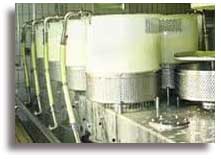
Top Institutions offering Courses
Dairy Technology |
Success Stories
The revolution of AMUL started as an awareness among the farmers that grew and matured into a protest movement and the determination to liberate themselves. Over four decades ago, the life of a farmer in Kaira District was very much like that of his counterpart anywhere else in India. His income was derived almost entirely from seasonal crops. The income from milch buffaloes was undependable. The marketing and distribution system for the milk was controlled by private traders and middlemen. As milk is perishable, farmers were compelled to sell it for whatever they were offered. Often, they had to sell cream and ghee at throwaway prices.In this situation, the one who gained was the private trader.
Gradually, the realization dawned on the farmers that the exploitation by the trader could be checked only if they marketed their milk themselves. In order to do that they needed to form some sort of an organization. This realization is what led to the establishment of the Kaira District Cooperative Milk Producers' Union Limited (popularly known as Amul) which was formally registered on December 14, 1946. The Kaira Union began pasteurizing milk for the Bombay Milk Scheme in June 1948. An assured market proved a great incentive to the milk producers of the district. By the end of 1948, more than 400 farmers joined in more village societies, and the quantity of milk handled by one Union increased from 250 to 5,000 liters a day. India's progress as a country is highly dependent on the growth of its rural areas. This is where technology can help to a great extent by providing right solutions to empower the rural economy.
